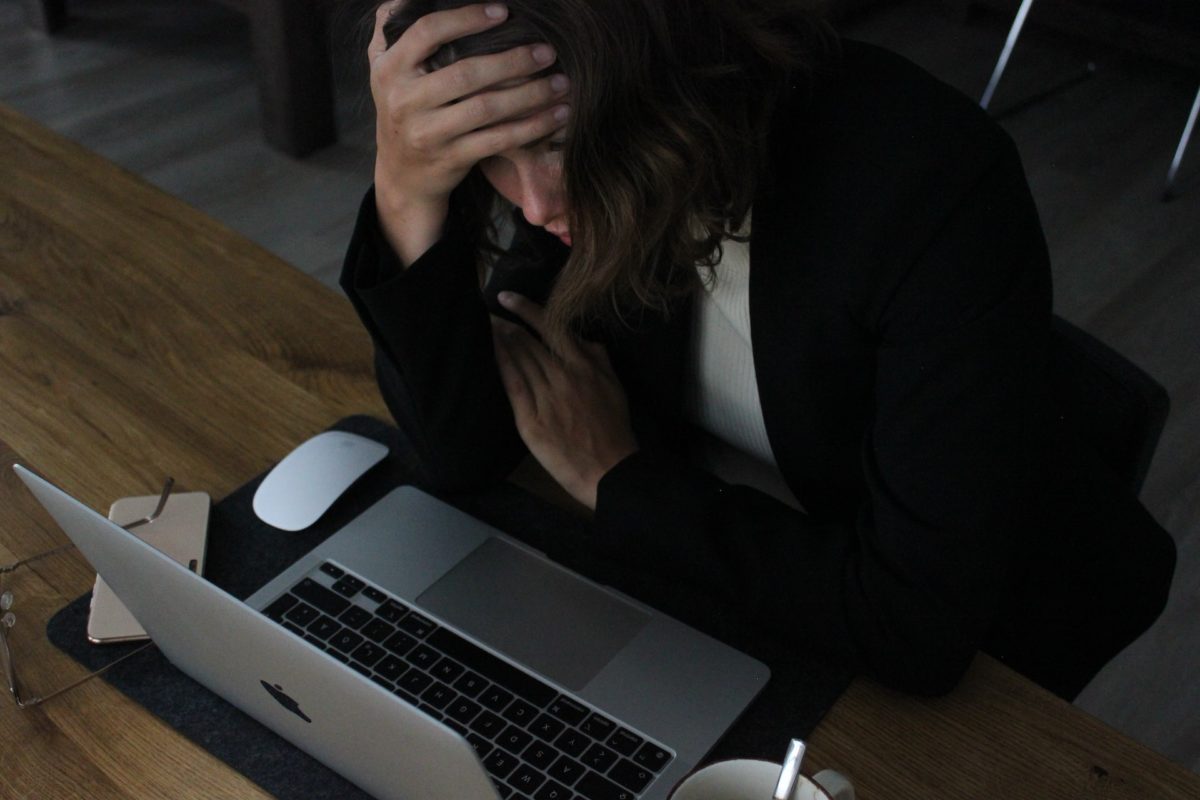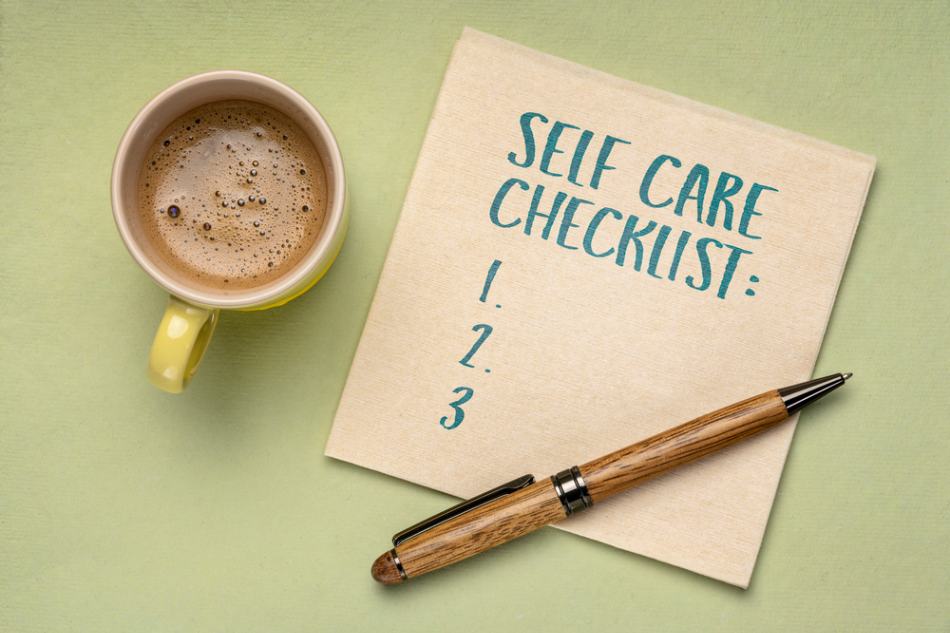July 8, 2021
Webinar: Stress vs Burnout
Written by Rachel Eddins
Posted in Stress Management, Webinars and with tags: burnout, stress management

Do you know the difference between stress and burnout?
You will learn ways to manage both and how to prevent burnout.
Facilitated by Rachel Eddins, LPC, who was filling in for Suzanne Kamfar.
Watch a replay of this presentation here.
Learn more about our stress management services and professional burnout.
Here is a transcript of the webinar:
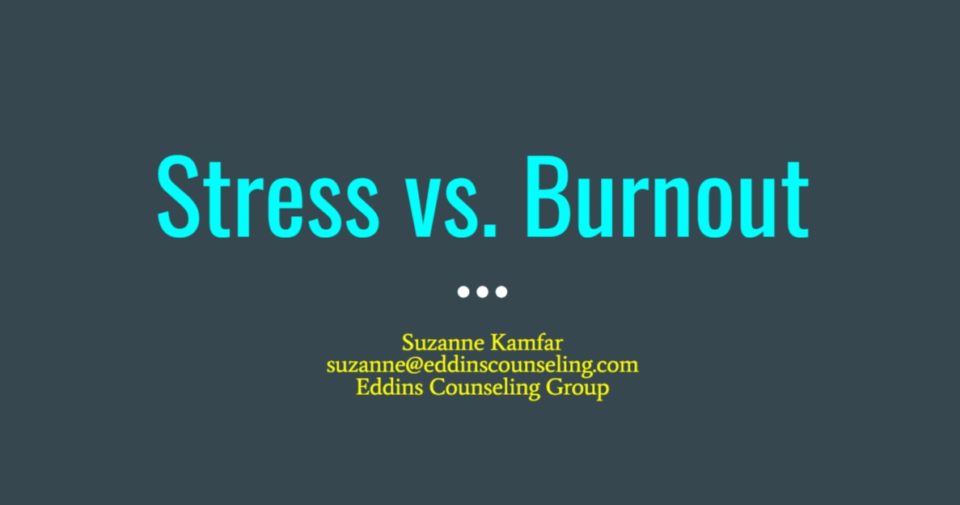
We’re talking about stress vs burnout because most people are very familiar with stress, but what we want to also make sure is that they are aware of the signs and symptoms of burnout because burnout is actually now a medical condition.
It used to not be characterized that way, it used to just be a word that we would say, “I’m burnt out”, that kind of thing. But now it’s actually a specific medical condition.
We want to recognize when stress gets too far so that we can avoid sliding into the more physical and emotional state of burnout. Burnout makes it really difficult to function and things like that, so we’ll be talking about that.
I, Rachel Eddins, am filling in for Suzanne Kemfar, who is sick tonight. So she has put everything together today, and I’m sorry she can’t be with us tonight.
The Everyday Life Experience
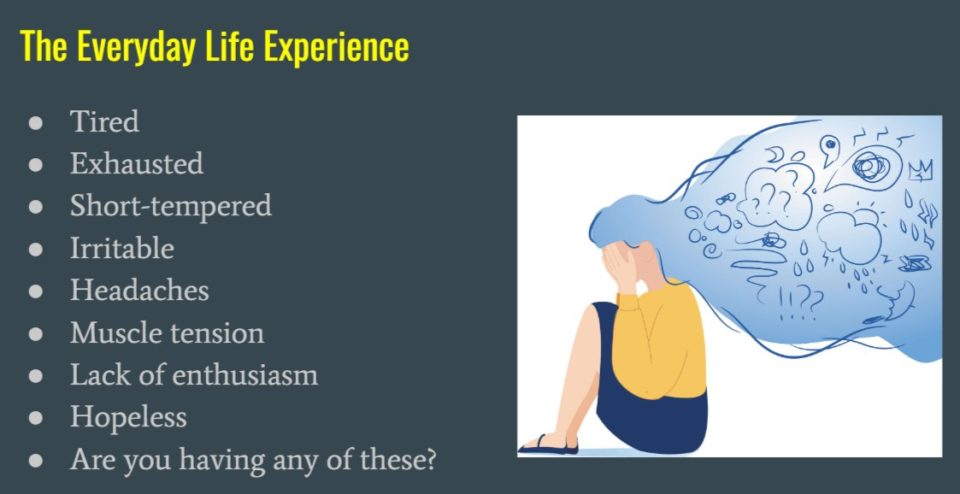
We all experience the everyday symptoms of stress. How many of you have any of these symptoms or have recognized any of these symptoms:
- Feeling tired
- Feeling irritable
- Short-tempered
- Physical symptoms such as:
- headaches
- muscle tension
Those sorts of symptoms happen because whenever we are in that stressful place, our body goes into the fight or flight response and that is what’s actually preparing us to take action, to run away from the “old school” perceived stress, which is a dangerous tiger.
So it makes some physical changes happen to our bodies to prepare us to go escape that danger.
But unfortunately, if we’re just sitting at our computer desk or standing there, (if) we don’t discharge that energy that our body has prepared for us and it gets stuck into our muscles and creates this tension, exhaustion, irritability, headaches, and other sorts of symptoms.
If you go to the doctor because you have headaches or muscle pain and your doctor says, “Well, we can’t find any reason for that”, you might want to look and see if stress could be a possibility.
Another thing that you might experience is gastrointestinal symptoms because that’s also where that stress responds. It shuts down our digestive response, so it doesn’t work as effectively. It can contribute to those kinds of symptoms as well.
Sometimes it’s not just the mental and emotional symptoms, it’s also the physical symptoms that we notice when we’re feeling stressed.
What Is Stress?
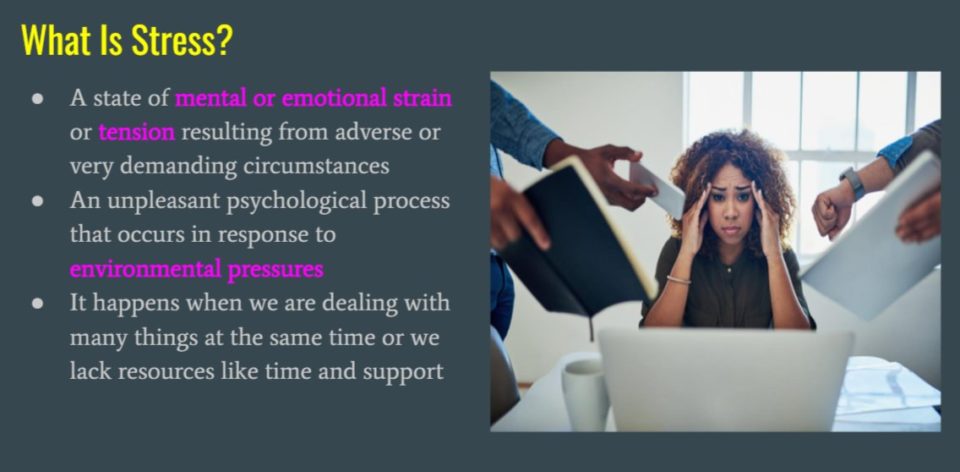
So, what is stress?
As I said, it’s probably a word that we use all the time, but it is that sort of mental or emotional strain that we experience from demanding circumstances.
When we experience this on an ongoing basis, that’s when we have chronic stress. What we’re going to talk about is when we’re under periods of chronic stress for a long period of time, which is when we can slide into those medical situations of burnout.
If you look at the example of what can contribute to stress, like dealing with many things at the same time or lacking resources such as support, especially over this past year, you can imagine how our society is pretty much living at a stressful pace for the majority of the time.
So it’s no wonder we’re seeing a very high number of people that are experiencing chronic stress.
Stress on a Spectrum
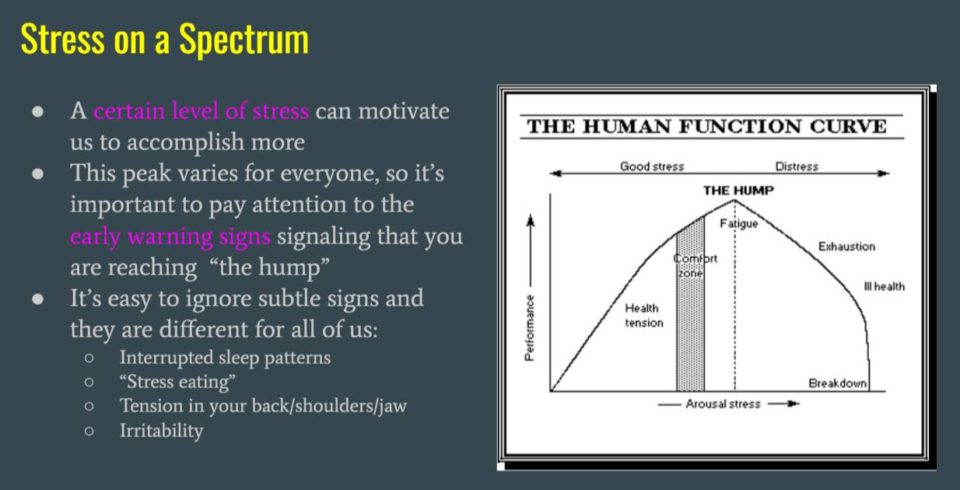
We can look at stress on this spectrum above. So one of the curves here shows you this sort of cycle of stress which is appropriate. We want to have some stress. Some stress gets us motivated.
So let’s say you have a deadline, and then you have that sort of last-minute, that’s positive stress that gets you motivated to get the task done.
We can get into this little comfort zone when we have no stress, but then it’s almost like we’re sliding into a depression or a lack of motivation. So some stress in this zone is pretty good.
But before we hit the hump, we want to be aware of those warning signs. Once we do, then we’re going to go into a state of unhealthy stress, and that can eventually contribute to physical ill health and then collapse.
So really, when we’re talking about burnout, we’re actually falling into a state of collapse in our nervous system.
The Warning Signs of Stress
But what are some of the warning signs that let you know that you are hitting this hump?
Some of the things I have listed here are:
- Interrupted sleep patterns so that, for example, you can’t fall asleep because your mind won’t stop thinking about all the stuff from the day, or even if you’re just thinking: “Oh, I didn’t do this, or, oh, I need to do this tomorrow”.
Just having those kinds of thoughts. It doesn’t have to necessarily feel like an anxious thought. Or maybe you’re waking up at 3:00 in the morning and then you can’t fall back asleep. That’s an example of interrupted sleep patterns which is really common when we’re stressed. So sleep hygiene is something that we’re going to want to pay attention to.
- Also, stress eating is another sign. Maybe you’re not always eating crunchy foods, but now you’re noticing that you’re craving salty or crunchy foods more often, then that’s the sign that you’re getting close to that hump there.
- Tension in your back, shoulders, and jaw. This is where we carry the stress tension. So when we have aches and pains in other parts of our body that can be from anger, all different emotions, we can carry that in our body, but particularly the back, the shoulders, and the jaw, that’s where we carry our stress.
A little tip if you do feel stressed, is to just massage your jaw muscle, just really gently, and that can kind of help release that tension.
If you do find that you’re craving crunchy foods, then rather than eating try rubbing your jaw. It might just be that your jaw needs to kind of release that tension. So you might try that first and see if that helps.
**Warning**: Stress Hump Ahead
What are some signs that you’re about to hit that hump that tells you stress is too much? How do you know that you’re getting too stressed?
For example, things like:
- Irritability, and
- Stress eating. Craving ice cream or carbs, things like that mean more you need comfort. And that might indicate that you need more support.
- Becoming confused. That’s a really good example of an emotion. And it’s literally because your nervous system going into fight or flight mode and has taken that prefrontal cortex offline. It’s not working as effectively as the part that’s responsible for decision-making and problem-solving. So that’s a really good example of physically what happens in our body.
- Becoming very direct in your communication. It’s almost like there’s not enough time or space to put in all the fluffy. And then that can contribute to more stress because someone says it comes off as angry, abrupt, and unapproachable when you’re just trying to get things done and move on. And then that can certainly create more stress.
- When I get home from work and I can’t accomplish anything on my to-do list. That sounds like I’m feeling too tired and I don’t have the energy, both cognitively and physically. And those are your body and your brain saying: “Yeah, it’s too much, I’m overloaded”.
So we want to have a little bit of stress. We just don’t want to have too much stress.
Not All Stressors Are Bad
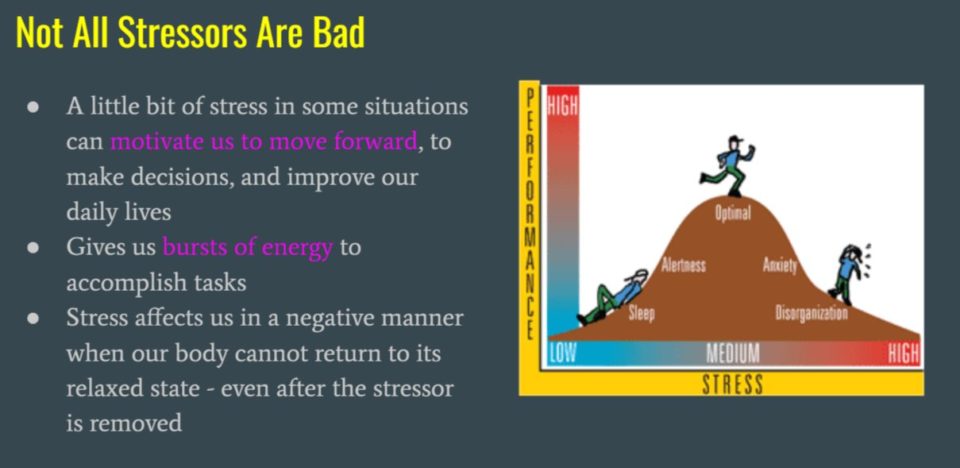
A little bit of stress, as I said, it motivates us to move forward, and it can help us to make decisions.
I don’t know if you’ve ever had a choice between two things, and you can think about it and think about it but once it gets close to a deadline, all of a sudden it might seem like: “Okay, it’s clear I really need to do this”.
It might just be that you didn’t want to let go of the other option but once we feel a little bit of that stress, it can help us to move forward. So we do want to have a little bit of that.
What’s happening when we’re in a stressed state for too long? Some people are saying: “I’m too tired to do things”. It’s because our body can’t return to its relaxed state when the stressor is removed, like when we get home or away from work, maybe if that’s where the stress is.
Our body cannot go back to that relaxed state. It’s really hard for our bodies to do that. And that’s when we’re sort of crossing that bridge into something that is more unhealthy for us physically and emotionally.
Different Types of Stressors
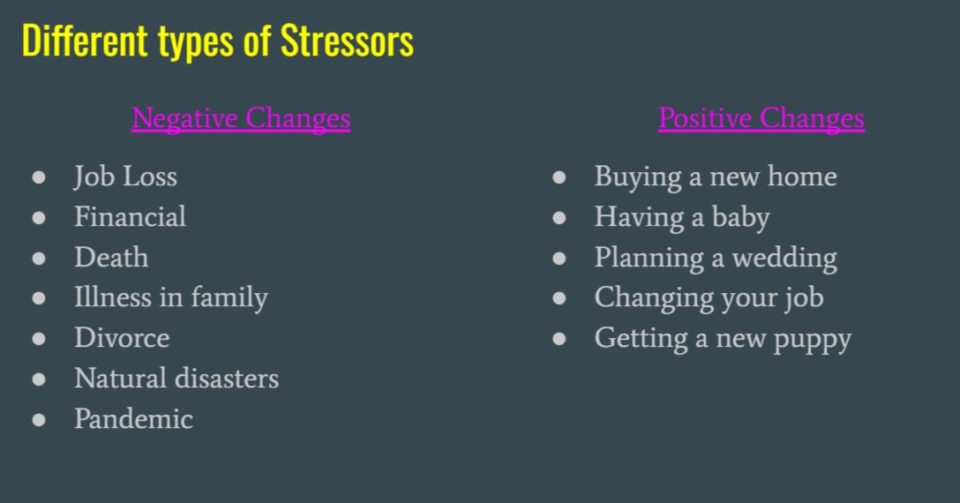
You’re probably aware of all of the new things that cause stress. But here are some of the really big ones. The things that are on the negative changes list are considered top stressors.
These are the top stressors that people experience on a scale of 1 to 100, let’s say:
And these are actually, for some people, big stressors, and for some people, they even cross over into the area of traumatic stress. That really can impact our nervous system in a powerful way. So these are some of the big-time ones.
So even if you’re not aware, it’s really a good idea to get some support if you’re going through any of these types of things because it’s such a major stress.
But there are some things that are stressful that we might not recognize, like positive changes.
- Buying a new home can be very exciting, but then that can create a whole new world of stress.
- Having a baby,
- planning a wedding,
- changing your job, even if you’re changing your job to something positive,
- getting a new puppy.
So essentially, whenever we have changes in our lives, even though we want to change and the change is positive, it does create stress.
It creates more work, changes in a routine, and things that we need to get adjusted to. So some of you may be dealing with that and some may not, but just be aware of all the different things that can create stress in our lives.
Signs of Stress
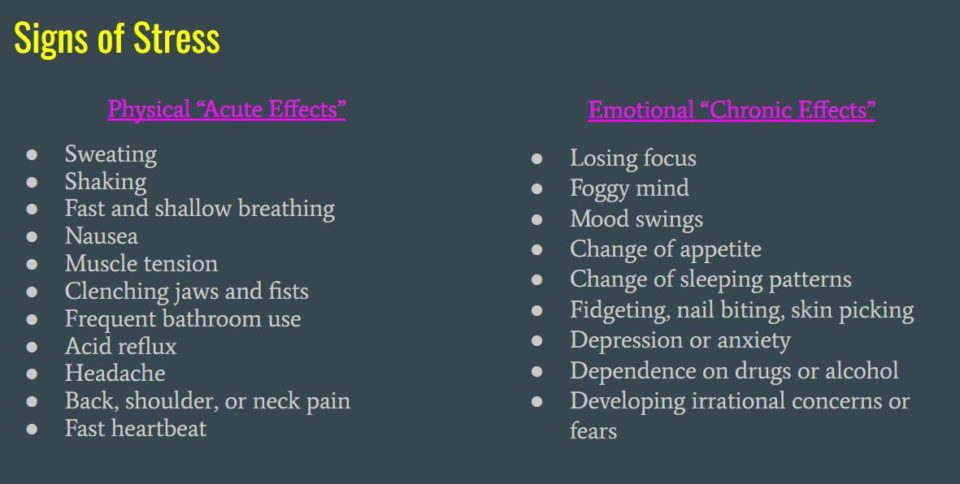
Here are some more acute physical effects of stress. Things that are in the moment, like for example, sweating. You can think of sweaty palms from going out and meeting a new person. Another example is nausea.
As I said, it really does have a strong impact on the gastrointestinal system for a lot of people (not everybody). So there are things like acid reflux, frequent bathroom use, nausea, and even constipation. All of those sorts of gastrointestinal symptoms could be acute symptoms of stress.
We already talked about clenching your jaw and I really encourage you to massage your jaw. I think that can make a big difference. The headaches and muscle tension, are also physical signs, meaning your fight or flight nervous system has been activated, but that energy didn’t get discharged.
Another example is a fast heartbeat. Sometimes that can feel really scary if you’re experiencing sweatiness or shallow breathing. Even dizziness could be a symptom.
Sometimes people worry that there’s something wrong with them. It’s important to recognize that that could just be a sign of stress or anxiety about the situation and not necessarily a physical medical concern.
You actually have a little bit of control over that by activating the relaxation response.
Some emotional side effects include losing focus.
When your body’s fight or flight system is activated, it’s kind of like taking the thinking part of your brain and turning it down a little bit.
So your mind is not as clear. You might not have as good of a focus. You might find that you’re reading the same sentence over and over and over. Or thinking: “Why has it taken me so long to read this? Or I can’t write. I can’t think straight to write something”, things like that.
That’s because when we’re in that danger zone, thinking is not as big of a biological priority as running away from, for example, a tiger trying to eat you.
So it’s sort of trying to conserve your resources into running away from danger.
How Stress Affects You
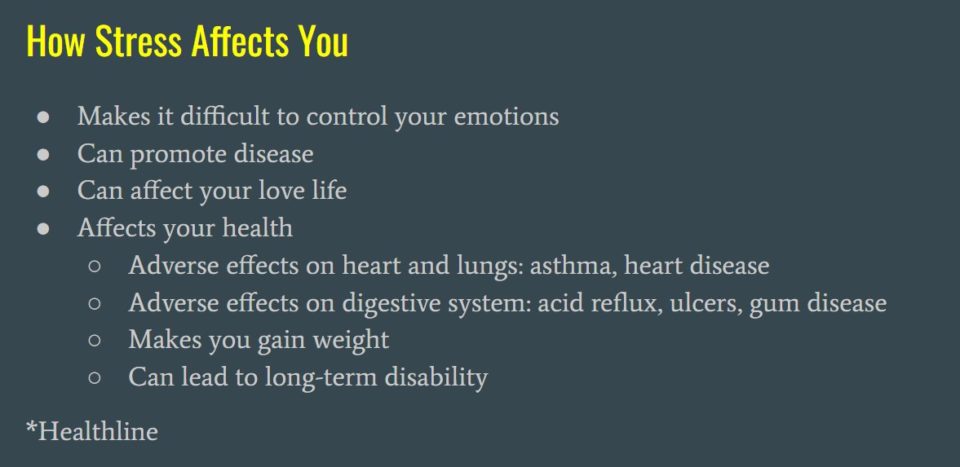
Another way that stress can affect you is it can make it difficult to control your emotions. Maybe you’re snapping at somebody and not realizing it or feeling more negative than usual. You might be interpreting a situation with a friend like maybe that friend didn’t text you, and you might feel more upset than usual or interpret that more negatively than you might normally.
Obviously, you’re aware it promotes disease. It can affect your relationships and it can even contribute to weight gaining, even if you do not necessarily stress eat.
And that’s simply because, if you think about your body is in a state of trying to preserve survival, then it’s not going to be at the same time trying to lose weight or maintain your weight. It’s trying to focus on survival so other normal processes that happen in our body are what we would say downregulated, meaning they’re slowed down or they’re not working at their prime.
So you can have side effects even though you haven’t necessarily changed some of your other habits.
Unhealthy Ways To Deal With Stress
I think everybody kind of knows some unhealthy ways to deal with stress.
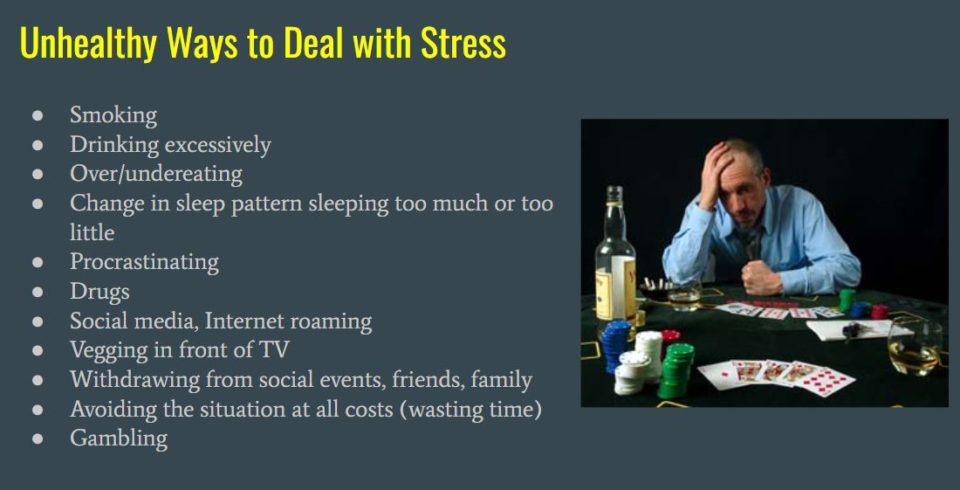
Now, we’re going to watch a little video:
“I have a different method to deal with stress, and it is called dancing.” -Ellen
How are you feeling after watching the video? What’s the one word about how you feel right now at this moment?
So technically, Ellen was sharing about how she was being funny, but she was being real about stress and how things could just go from one thing to the next. I really love the comments about being validated and being seen because we’ve all been there. We can laugh at it but it’s also so true that this is how it goes.
A good way to shift out of whatever state that you’re in is to go into the opposite state.
So if you’re feeling angry or you’re feeling sad or stressed, you can switch by watching comedy, so going into the opposite emotion.
And if you don’t have time to watch a comedy or cute cat videos or cute puppy videos as a stress-relieving break during your day, simply just sitting there and turning up the corners of your lips there and having a half smile can change your mood because the muscles in our face are actually wired to parts of our nervous system and impact how we feel and impact our mood.
You might be upset and stressed upset at somebody and don’t even realize that your brow is furrowed.
Watching something or engaging in something that is an opposite emotion or simply doing a little half smile can be a powerful way to shift your mood at that moment.
So when we talk about stress management, we’re not really talking about making time for this big thing. We’re talking about 30 seconds, a minute, five minutes, every day here and there. And that’s going to be the really powerful way of helping you cope with day-to-day stress.
When I put up the first slide and talked about our everyday lives, this is just our lifestyle nowadays, to have a stressful life.
And especially now that people are back in the office, there’s more traffic, there’s more getting from here to there. So regardless of the situation that we’re in, our lifestyles are pretty stressful as it is.
Healthy Ways To Deal With Stress
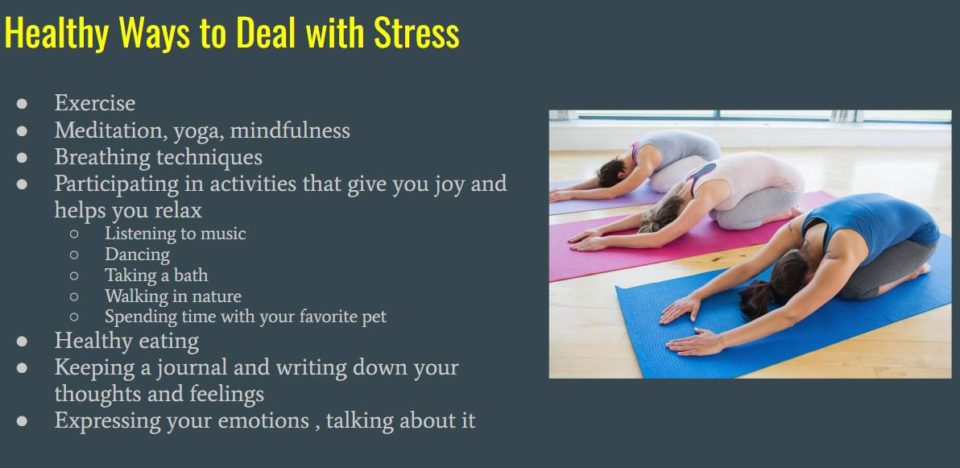
If we’re thinking about healthy ways to deal with stress in 30 seconds, five minutes, or ten minutes here and there in your day, what are some ways that you do that right now? What are some things that you do that help you when you’re feeling tense or stressed at the moment?
I want to say one other thing about what Ellen said at the very end. She said dancing. And actually, that is a really good one because when we’re in that fight or flight mode, our body is holding on. It’s like it’s sort of preparing to run away or to fight, literally. And so we’re holding all that tension and dancing moves can be really great. Other examples are going for a walk, deep breathing, getting outside, breathing fresh air, and disconnecting from technology.
How many of you have an opportunity to do that on a regular basis? Or I guess what I’m asking is how many of you know “this is what works for me versus I’m able to do this when I need to?” Sometimes it can be hard to get outside. When we have deadlines or we have too many things or too many demands or maybe stuck in a certain space, it can sometimes be hard to do those things.
Another healthy way to deal with stress is moving to a different space.
The visual stimulation of being in a different room is incredibly helpful. But changing your environment is a really powerful way to destress. So I call those brain breaks.
So when you’re working, taking a brain break can just be stretching your arms overhead, or walking around. You don’t have to go for an actual walk, even though that is really ideal. But just simply five minutes where you are literally walking around your house or walking around your office and going down the hall.
I switched from an office where the bathroom was right next to my office to where the bathroom was down the hall. And I noticed what a big difference that made in having to walk further away to go to the restroom and then come back. It actually really gave me that chance to have a brain break.
Taking a little brain break throughout your day is a really helpful way to keep your body out of the stress response.
Someone commented that she made a pond in the front yard to force herself to get out. She says she “loves water and giving herself permission to enjoy the fountain is very relaxing”. I love that.
So there are three things you created that you really enjoy. So if it’s something I feel like I have to do, like “I should exercise. If I’m going to go for a walk, what’s the point? In five minutes, I should go for 30”. Those are going to be things that don’t work in the long term, but things that you really enjoy, things that are easy to do, short and simple.
I like to say make your goal a five-minute action and commit to whatever that five-minute action is every day. Let’s say it could be five minutes or less. Those are going to be things that you’re more likely going to stick to.
And then she also talked about water. The water is very peaceful. Notice I have water in my background. That’s not legit. I put that there for your guy so you guys could see a little relaxation because water is very relaxing for a lot of people.
And she also mentioned giving herself permission. And I really love that because a lot of times we have stories in our mind, and that’s going to be part of our stress management, to pay attention to what our mindset is.
We might have stories like: “Well, that’s too much, I don’t have time. I have too much I have to get back to or they need me or whatever that is”. And just giving yourself permission to take care of yourself in a realistic way, something that’s doable, and setting a five-minute action that you can do.
Giving yourself permission is a very important self-care skill.
I want you to think about expressing your emotions, and talking about them. Obviously, you can do that in counseling, or you can do that with a friend.
There’s research that shows that simply naming your feelings actually allows you to tame them.
So let’s say you’re feeling overwhelmed, whether it’s anger, anxiety, stress, worry, fear, or anything like that. Simply naming it then helps your brain to then regulate it. And you can feel better just by naming it.
So when you say: “Well, that really hurt my feelings, when so and so… I’m feeling really sad right now, I’m feeling really defeated or really powerless”. Just saying that acknowledging it can then help you to feel better.
A lot of the things that you could do on a daily basis should be very simple. Like, short, simple things and not necessarily making big lifestyle changes. Some people find that keeping a journal and writing things down is helpful. Some people find it easier to talk to a friend, a partner, a therapist, or someone else.
Stress vs Burnout
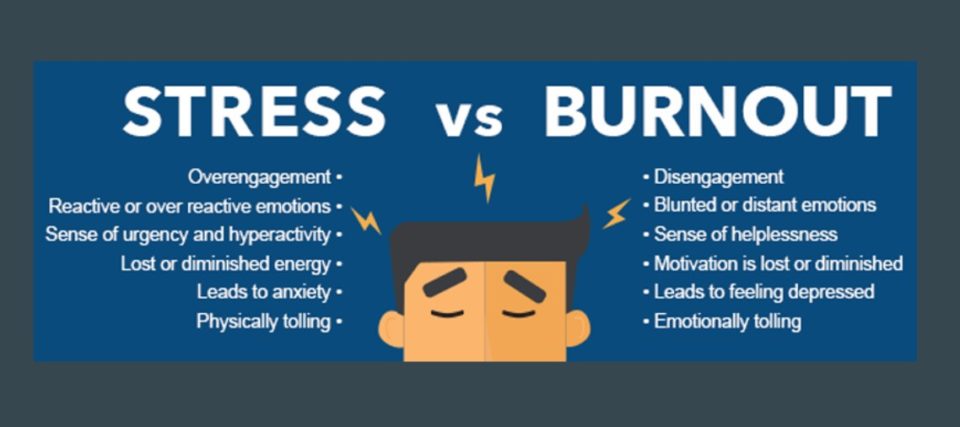
Now we’re going to switch to stress and then burnout. So we want to be really careful about burnout because burnout is stress in and of itself.
We already discussed it leads to physical and emotional symptoms. But once we move into burnout, we’re talking about a serious medical condition where it’s much more difficult to kind of move back out, and you’re probably going to need more support.
Recognizing the symptoms of burnout is important so that you can get the support that you need.
With burnout, we’re not really in that fight or flight. We’re almost in a more of a collapsed place if you think about it. Like, “I just don’t care. I’m just not interested. I’m just not motivated. Everything feels difficult. Everything feels overwhelming”.
It’s sort of that sense of I used to have this habit of washing my face before I go to bed, and now I just don’t feel like doing it. And if you think about it, it’s like: “Oh, I’m just talking about washing my face”. But sometimes those tasks, those activities just feel so overwhelming. And those are the symptoms of burnout that somebody has moved from chronic stress more than likely to a burnout state.
It can look a lot like depression, but it is different from depression because it’s really the result of chronic stress.
Some of the other feelings that are common to burnout are just feeling self-doubt. Certainly, you might be familiar with the phrase “the imposter syndrome”, but this is almost like: “I’m a fraud. I can’t even wash my face! How can I be doing this other stuff?” These strong feelings of self-doubt and certainly questioning yourself, feelings of inadequacy, and feelings of shame are very powerful feelings here too.
It is important to recognize feelings of shame for what they are and that might be “I’m not good enough”“. If you’re having thoughts like: “I’m not good enough”, or thoughts about yourself as a person, like: “I missed a deadline, I wish I didn’t do that, I am a failure”. So the second statement is going to be a statement that’s more of a shaming statement, like: “I am bad”.
Those kinds of thoughts and those kinds of feelings are going to make things a lot worse and lead to more turning inward.
When we feel those feelings of inadequacy and shame, then biologically that emotion pulls us into ourselves, and then we’re less likely to reach out for help.
And it makes it a lot harder to reach out for help and then, of course, that cycle kind of gets deeper and deeper and deeper. I want you to pay attention not just to how you’re thinking, and how you’re feeling, but also to what are some of those thoughts, that mindset that you might be telling yourself about the situation or about you as a person can be unhelpful and create more stress that’s unnecessary.
That unnecessary stress, we call that suffering since it’s a pain because the situation is overwhelming. That turns into suffering because of the negative relationship with yourself. So instead of having that approach, we want a really compassionate approach to ourselves. It makes sense that you’re feeling this way because this is really hard.
Taking a more compassionate approach to yourself, it makes sense that you don’t have the energy to wash your face. It’s not because you’re a lazy person, it’s because you’re really exhausted, you’re really tired, you’re really burnt out. So we’re using that skill of name it to tame it and then adding compassion with that versus shame so that we don’t do or how they say “turn the mountain into a molehill” kind of situation.
What Is Burnout?
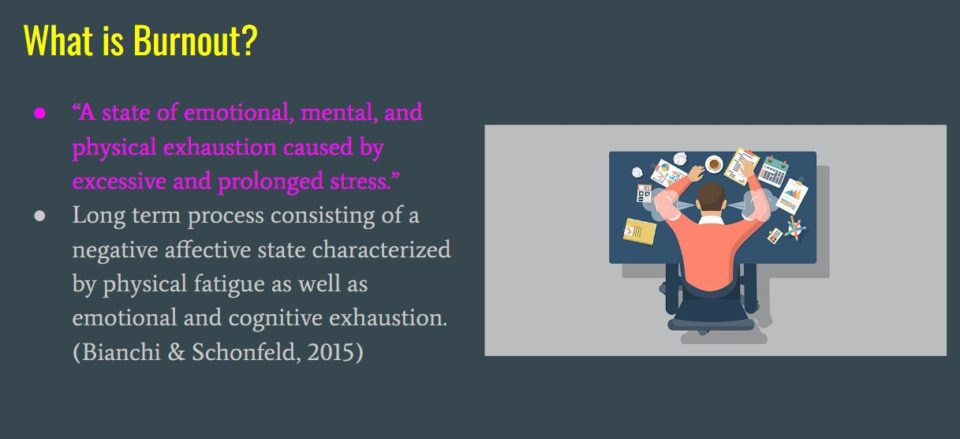
Let’s keep talking about burnout.
So this is “a state of emotional, mental and physical exhaustion caused by excessive and prolonged stress”.
Some of the obvious things are this past year or year and a half or however long it’s in all of the health care worker people in health care disaster responders, teachers, people that are in professions that are high demand and low breaks. So like a teacher has little time to take a break, or a healthcare worker oftentimes has little time to take a break.
People that are in professions like that are more susceptible to burnout because of that. The body is not really going into that relaxed state very frequently at all. And there’s excessive and prolonged stress.
So that is pretty much the condition that sets somebody up for burnout. It is a long-term process, it’s that physical fatigue. It’s almost like a sense of it feels too hard to lift my arm to wash the dishes or I can’t get out of bed to exercise. It becomes a never-ending cycle. A lot of times, as I mentioned earlier, people might confuse it with depression, but it really is burnout.
Dimensions of Burnout
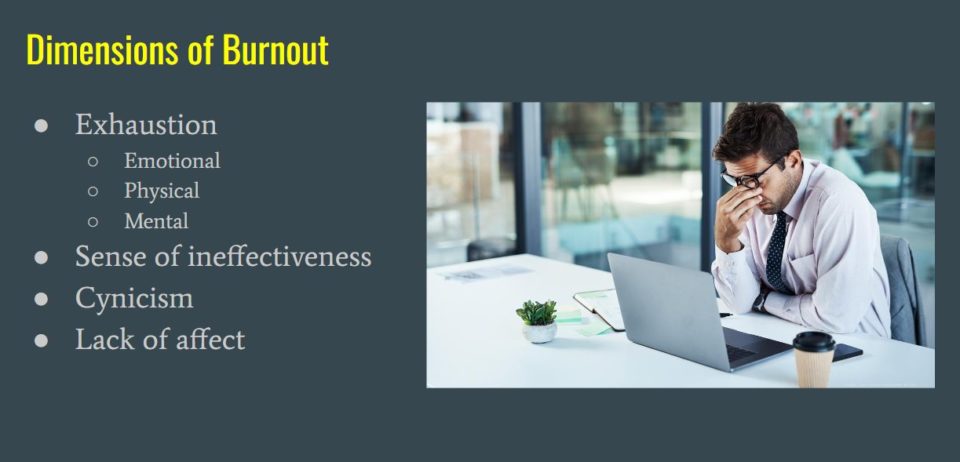
It’s also cognitive exhaustion where you might find that your mind is just foggy and you’re forgetting things easily. I had a friend one time who was in that burnout state from an excessively toxic work environment and she was constantly losing her keys. And that was a really clear sign to me that she had that cognitive exhaustion. Just that detail of remembering where she put her keys was just too much so she was losing them.
So there’s also the sense of ineffectiveness. And that can come across in different ways. A cynicism like: “What’s the point?” And lack of effect, a fancy way of saying that you might feel numb. Like, for example, if I said: ”How are you feeling?” And you might just say: “I don’t know, I don’t really feel anything or tired.” There’s not really a strong emotion there. When we think about what’s happening physically our body has gone from sort of our everyday relaxed nervous system state to a stressed fight or flight state to a more collapsed and fatigued, “I give up” or a “freeze” state.
So physically our body has kind of moved into this other nervous system that is not really geared up to run away from danger or to fight the danger, but rather just to freeze. That’s kind of what’s happening in the body and that impacts us physically, emotionally, and mentally.
Primary Signs of Burnout
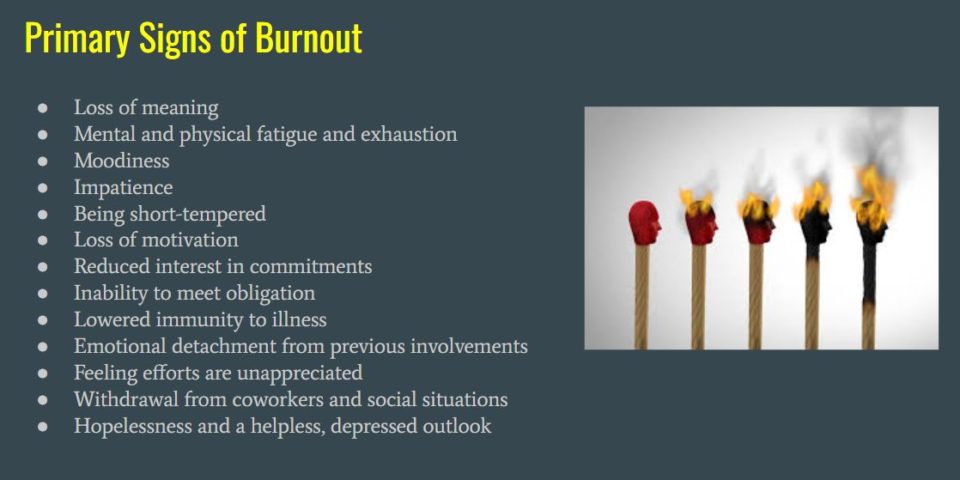
I wonder if anybody can relate or thinks they may have ever experienced any of these symptoms or signs of burnout. Moodiness, impatience, reduced interest and commitments, so responsibilities, and a lowered immunity to illness.
Sometimes what can happen is that we’re in that fight or flight state long enough to get through the crisis and then as soon as it’s done, then the immune system collapses because we’re kind of flooded with adrenaline and cortisol and those sorts of chemicals.
And then as soon as we’re done, the thing passes. Then all of a sudden we get sick. That’s when the body collapses and the immune system is not really functioning as well.
I know that when I had a major exam before my licensure, the next day I got sick. Another sign is not wanting to get out of bed. That is definitely a sign that you’re just feeling so exhausted and so fatigued that it’s just hard to get going. It’s hard to get that motivation, but also just that energy going.
Feeling detached from previous involvement is another way of saying it affects feeling numb or not feeling anything.
Withdrawing is a normal experience, but also dangerous because what we really need is more support and more connection. So someone shared: “I’m in burnout now. I couldn’t fight off a couple of infections and was confused and disoriented.” Those are signs that the body is just not working properly anymore. That sounds really, really scary, actually.
I hope they were able to help you out, but that does sound really scary. And we can feel really scared that there’s something physically wrong. It is similar to depression, but all of those things are happening because it really is how our nervous system is responding to the situation. I like to think of it as if you push the pedal to the metal too hard, the engine gets burnt, and it’s kind of like that.
Risk Factors of Burnout at Work
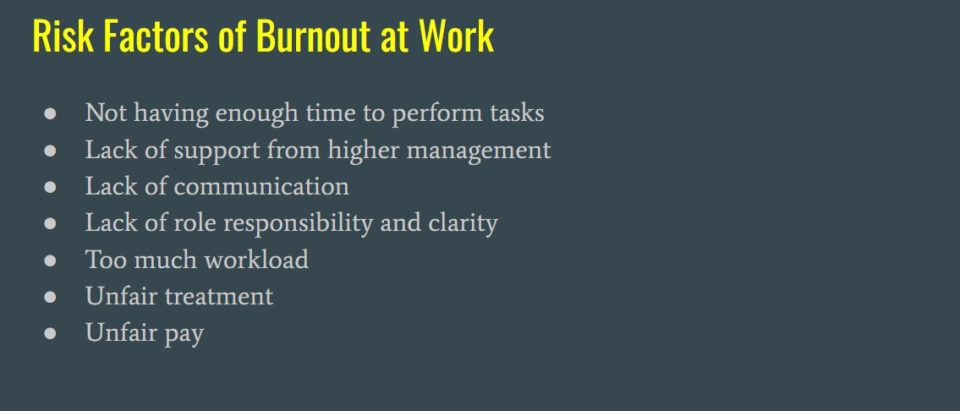
What are some risk factors at work?
- Lack of support
- lack of communication
- lack of role responsibility and clarity,
- too much work,
- unfair treatment,
- unfair pay, and
- not having enough time.
As I said, there are some professions that have more of a risk factor, but certainly, this can happen in any profession and in any situation. And then if you add our own internal things on top of it, it can make it worse. So maybe there’s fear.
Certainly in the pandemic when things like that started, there might be fear that there are no other jobs, or what if we get laid off? And so then these patterns kind of perpetuate and continue.
Talking about the mindset just for a minute, getting entangled in a mind-frame that focuses on the negative or catastrophizing or minimizing, those are kinds of things that you want to watch out for. Black and white, mentality perfectionism, lack of ability to consider resources.
So sometimes we’ve seen that happen in natural disasters. For example, people that do better from a mental health perspective than others are people that know how to access the resources. So whether that’s shelters, FEMA, insurance, or others. But regardless of socioeconomic status, people that know how to access those resources do better from a mental health perspective in disaster situations.
Asking yourself if you don’t know what I mean by black and white thinking. It’s sort of like “this or that”, and that’s it. So if you notice that you’re having that sort of mentality and thinking: “They’re bad or they don’t support me”, just sort of that all-or-nothing kind of thing, then recognize that that can also contribute to how you feel and contribute to the cycle.
Prevention
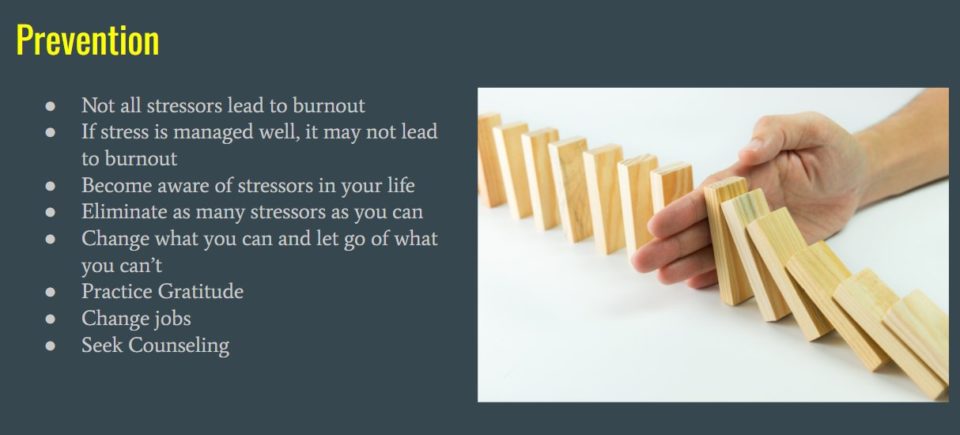
What can I change and what can I let go of? What do I have control over and what do I not? Sometimes how we think about a situation is also something that we can either have control over or not.
Not all stressors necessarily lead to burnout.
It’s just this idea that if we are in a situation where there’s chronic stress, that’s when it’s a bigger risk factor. So how do we eliminate stressors? So there’s a point on here: “Eliminate as many stresses as you can”. How do you do that? You don’t get rid of the new puppy. You don’t quit your job if you need the finances. What can you really do? Does anybody have any idea, how can you eliminate stressors or let go of things?
Getting stuck in powerlessness, that’s a really dangerous place to be.
Someone left a comment saying: “Set better boundaries.” I absolutely love that. So not everything is an emergency, whether it’s work or whether it’s people or relationships in any situation in your life. Setting better boundaries can be very hard to do, but it certainly, helps to eliminate some of those stressors. Of course, setting boundaries cover a pretty broad range of things.
How do you let go and eliminate stressors? I’m asking that because I know a lot of times when we’re in a burnout situation, it feels like we don’t have control.
The next thing is to do one thing at a time.
Another example is step-by-step. Sometimes my task list can get very long, so I like to do one thing at a time, but I also like to filter it out so that I can only see one thing at a time and I’m not even visually overwhelmed. Just seeing it all visually overwhelms me and can create a feeling of stress. So even just filtering it and focusing on one thing at a time can be helpful and then that one thing might be really big.
Going back to that sort of five-minute thing is breaking down a task into smaller and smaller tasks.
Something that they found in a research was that simply scratching something off your to-do list increases or gives you a dopamine boost.
Simply scratching it off your list is helping to make you feel good. So what you can do is break your tasks down into smaller tasks and then check them all off as you do them and look at your progress.
Another thing that’s important when we get stuck in negative cycles is that we could see that things are really bad, and they’re not going to get better. What we want to do is make sure to take time to notice and appreciate the good. “I have so much stuff on my plate. Oh, look, I accomplished these three things.”
So instead of saying: “Those three things are not enough, because I have 20 things”, saying: “Great job, I accomplish these three things”. Just giving yourself that positive attitude can help you to feel better. That’s part of that mindset.
Another thing to add is that it’s easier for me to list what I expect of myself than have someone else look at it and remove what really isn’t as important. That is a really good strategy. So what she’s saying is because we are hardest on ourselves in most cases, having someone else take a look at the list and say: “Is that really important? Is that really important to do right now?” And then you can scratch things off that you thought you needed to do, but actually, you can let go of them.
What’s really helpful is to get another perspective.
She’s having her significant other do that. You can have a counselor do that. You can have a friend, a coworker, or some other person who might be able to give you another perspective and say either that’s maybe not a priority right now or maybe that’s something you can let go of. If it’s a problem, it’ll show up and you can deal with it.
The next one is to know your stress threshold and pace yourself.
That goes back to that little hump graph I was showing you earlier that you can recognize when you’re getting closer. You can sort of recognize you’re starting to get more irritable. I know for me, one of my telltales that I’m getting close to that hump is I start waking up at 3:00 in the morning. And that’s when I know: “Okay, that’s not going to work”, because then once you’re tired, that’s another source of stress.
Dehydration is actually another source of stress. So making sure that your body is well taken care of so that it can perform at the level that we are demanding every day is also very important. So just knowing your threshold and pace yourself, I think that’s really good.
The next one is eliminating stressors and letting go of things that you can’t change. Look at everything that’s creating stress in your life and see if there’s anything that you can let go of and what you let go of. Maybe it’s not something on your list. Maybe it’s not a situation that you’re in, but maybe it’s just a mindset, like a mindset that “I can’t do it, it’s too hard, it’s too much, they won’t listen”, whatever kind of mindset is not serving you.
See if that’s something that you can let go of or change if there’s nothing else.
Focus On What You Can Control
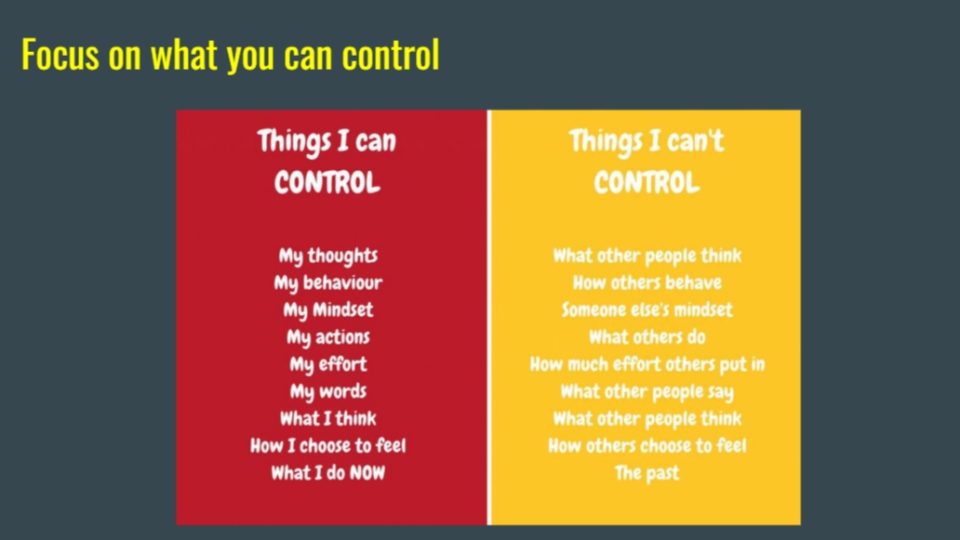
Powerlessness and helplessness are not very calming feelings that we have when we’re stressed or when we’re burnt out. And for many people, those are feelings that go way back to earlier times in their life, and they could almost be a sort of traumatic response.
For example, when I was growing up, I felt powerless and I’m in a situation now where I’m feeling powerless. You can see how that can also magnify the stress because it’s also a familiar place and that can feel really threatening. So it’s very important in difficult situations that we’ve all been through to look at what you can control.
So, my words, my effort, my actions, how I react, and my mindset. And you might not necessarily feel like you can control these things at the moment because when we are emotionally dysregulated (which is what happens when we’re stressed), it’s a lot more difficult to actually then take a step back and respond calmly.
But when we add in those little short, 30 seconds to five-minute self-care things, then it makes it a lot easier to have control over my words, my effort, my reactions, my actions, and my mindset.
Things will get better, things will change, and things can change! I can change whatever that mindset might be. My behavior, my thoughts. So negative thoughts about yourself versus compassionate thoughts about yourself, what I think, how I choose to feel. All these feelings are appropriate and normal.
What we want to be careful of is when we get stuck in a negative feeling, that’s when it’s dangerous. And I talked about how you can change the way that you feel by doing the opposite action.
You can also change your attitude and see how that impacts how you feel. As I mentioned earlier, you can try the little upturn smile and see if something like that helps.
Sometimes it can be really hard to change or to feel like you have control over how you feel because our emotions are automatic responses to situations. It’s the getting stuck in them that’s the problem, not so much the emotion itself.
What I choose to do right now, is something that you have control over, especially if you’re feeling even that feeling of feeling confused or disoriented that someone had mentioned earlier. That’s a really good sign. “I need to put this all away and take a step back.” Thankfully, she did take care of herself at that moment, and that’s really positive. And then make sure that you give yourself credit.
“So that was great. I did the right thing. I took care of myself. That’s positive.”
That’s something else that you can control.
We know some of these things that we can’t control such as what other people think, how they behave, etc. And even if there’s something about yourself that you’re frustrated with, like maybe something in the past, you can say: “Now I’m choosing to instead of getting down on yourself over something you’ve done in the past or some choice that you’ve made that is contributing to stress now.”
You can also change right now your thoughts and your attitude and your feelings about yourself.
Self-Care Strategies
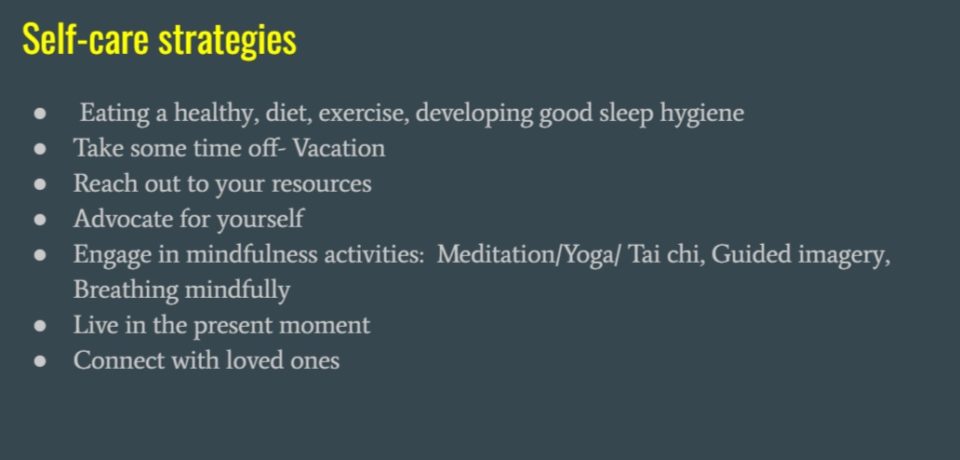
Here are a few self-care strategies:
We’re talking about:
- sleep hygiene,
- eating a healthy diet,
- exercise, etc.
Stress sometimes lives in the future. What is going to happen, what could happen versus what’s going on right now? What do I have to appreciate or be grateful for? Connecting with loved ones?
I want you to focus on something that is simple and doable. My recommendation is for you to be taking one five-minute action that you can commit to every day for the next two weeks.
First, you’re only going to focus on one thing for five minutes every day for the next two weeks. And I want you to be thinking about what that might be.
We look at self-care from a variety of different perspectives, and people respond differently to different things.
Self-care is essentially taking care of the physical body.
So the physical body is not so exhausted. Kind of like taking your vitamins and then you’re less susceptible to illness. It’s also giving your body a place to take a mental or emotional break. Some people are physical:
- going for a walk,
- being outside in nature,
Others prefer to do something sensory,
- smelling a good candle,
- aromatherapy,
- getting a massage,
- taking a hot bath, things like that are really effective.
Still others like an intellectual break. They are a little bit more intellectual, and they like to do:
- a sudoku puzzle,
- a crossword puzzle,
- or read a book or something like that.
Lastly, some people are more creative, so they might like to:
- do a collage. You could even just cut out pictures in a magazine and paste them together.
- sometimes that can be just an act of creativity or organizing photos into a photo album from your phone.
- It doesn’t have to be painting or drawing or anything like that.
- It can be a lot of different ways that you can be creative.
- Decorating your house,
- organizing your house.
So, people can be physical, sensory, intellectual, and creative. And for some people that connection is the most powerful. So whether that’s connecting with yourself through journaling or writing or connecting with others, talking, reaching out to loved ones, or just not feeling alone. I really like quiet time, mindfulness, and being thankful for at least three things that happened that day.
That gratitude practice has been shown to be very powerful.
What I want you to think about is that everybody’s different. So there are a lot of different self-care strategies, but everybody is different.
We’re not so different from a physical standpoint. There are certain physical things that our body needs to function well and to fight off the impact of stress.
But emotionally and mentally, the things that allow us to get into a more relaxed state are very different.
I also want you to think about you might see something that doesn’t really fit you and that’s because you’re unique and we’re all different. I will mention the physical stuff really quickly. They used to say “eight-ounce glasses of water a day”. And then other people say “half your body weight in water a day”.
Regardless, dehydration is a source of stress for the body. Your body can’t think clearly and can’t respond clearly. And then you’re going to find that have that ripple effect. Your five-minute action that you take over two weeks could simply be to drink more water. So that’s a physical thing that’s important. Sleep hygiene is another one.
Your body needs to be rested in order to respond more effectively to situations throughout the day.
Finding a way to have good sleep hygiene, what that means is going to bed at a time where you can fall asleep and have at least 7 hours of sleep throughout the night is part of that. We can have a whole hour-long webinar on if you’re having difficulty sleeping, and things that you can do to help that. But that’s another topic. And if you need some help with that, we can help you with that because we have a lot of effective strategies. But getting enough sleep at night is certainly something to put at the top of your list.
Paying attention to what you eat throughout the day, and just nourishing your body is also important because that’s what gives your body the energy to move forward. And you can just pay attention to when you have this type of food versus this type of food:
- How does your body feel?
- Do you have more energy or less energy?
- Do you feel more fatigued?
Sometimes when we have too many carbs, for example, then we could feel more tired, whereas when we do have not enough carbs, then we can have difficulty thinking and responding.
So just notice how your body responds to different things. That physical self-care is super important.
4-7-8 Breathing
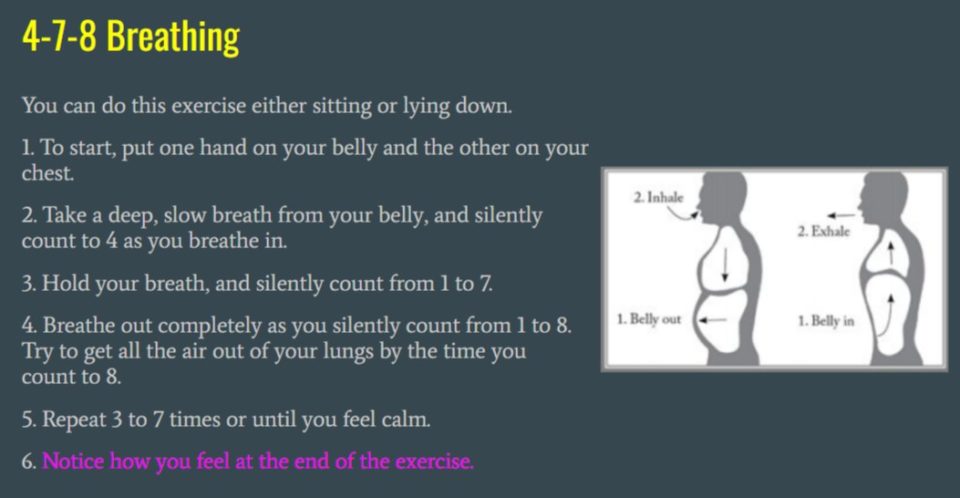
This is something I like for us to all do together just for a minute. When we’re stressed, what we’re trying to do is find a five-minute brain break.
Like I said, just get up, walk around, change your scenery, change your environment, or breathe to give yourself periods of time throughout your day that you are getting into a more relaxed state. So when you’re breathing or deep breathing, what you’re doing is you’re trying to actually activate that relaxation response.
Let’s just take a break here. And I want you to put one hand on your belly and the other hand on your chest, and you want to focus on the hand on your belly, take a deep breath from your belly and feel your belly sort of expand and silently count to four as you breathe in. And then you’re going to hold it and count from one to seven and then exhale a little bit longer.
What you’re doing here is you’re breathing in, holding it for a little bit longer, and exhaling for even longer. And so for most people, this activates your relaxation response and you can feel calmer.
I think there was someone earlier who mentioned getting up and going into the other room, changing the environment. I’m visual as well and I find that very effective. If it were me, it would be even better if I got up away from the computer, went into a different room, different environment, different scenery, or even outside.
Ideally, take three to five deep breaths. That can be your five-minute action for the next two weeks. I want everybody to make a commitment to what your five-minute action is going to be before we wrap up.
Simply taking a deep breath activates that relaxation response.
Now, some people have their nervous system wired in such a way that that calm feeling can actually trigger something, and then it doesn’t necessarily lead to you feeling calmer. So if that’s the case, there are other things that you can also try.
Changing temperature can be another way to activate some relaxation. So what you’re trying to do is change your body’s physical state because stress impacts your whole body, your mind, your cognitive state, your emotion, and your physical state.
So what you could do is get a washcloth wet, put it in the freezer, and have that cold washcloth and put it on your head for a minute or two minutes or something like that and just hold it there. And what you’re doing is you’re changing your body’s temperature. And that can help you are changing your body’s physical state so it’s going to take you from the stress response to a more relaxed response.
Another thing that you could do if you’re finding breathing or something like that difficult to do is actually splash your face in cold water, like maybe have a sink or a bowl where you have cold water with maybe a few ice cubes even, and just sort of put your face in there and splash your face. This can come as a little shock to the system but it will help your body to relax and change your state. So if your mood is too intense or the stress feels too intense, that’s a great way to just sort of change your body’s physical state.
You can also put oranges in the freezer and freeze those and use those like little stress balls and kind of squeeze that. That can be really helpful.
Clean Up Your Sleep Hygiene
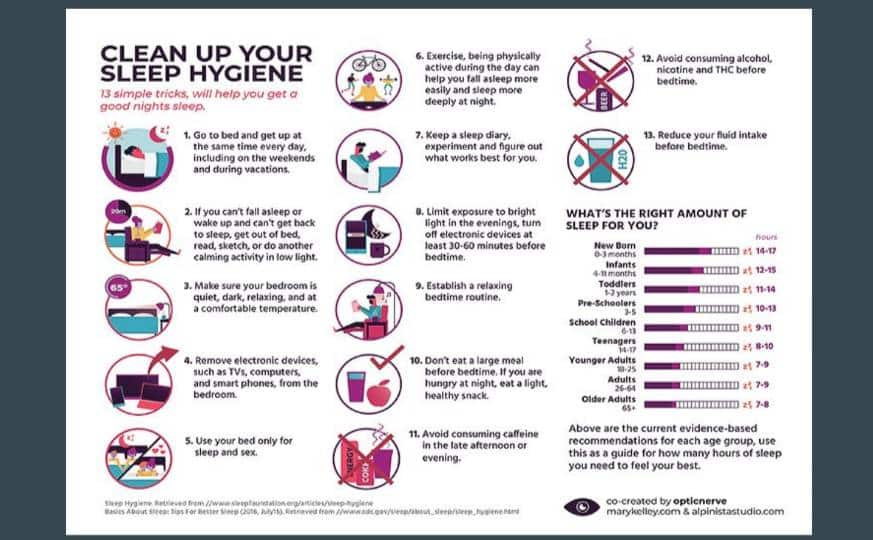
There is a really good blog post on our site on what to do if you can’t sleep or have trouble sleeping. And there are a lot of great tips in there that you can try. And like I said, you can work with one of us even just briefly to help with your sleep patterns, to help get that back on track because we have some effective methods such as cognitive behavioral therapy for insomnia. But we can help you with that because I really believe that sleep is the foundation. Sleep is very important for being able to fight off the impact of stress during the day.
Gratitude

Someone had mentioned in the chat earlier about practicing gratitude, and I think what she said is “just being thankful for at least three things that happened that day”. That’s a great example of mindset. It’s a great example of practicing gratitude. And again, putting you in a more positive or neutral state versus that state of feeling less than or overwhelmed or inadequate depressed, things like that.
Just taking the step of practicing gratitude or being thankful for three things that happened that day, if you have other people that you live with, you can make that a habit to do together. You can share that with one another. I think that’s a really great way to either start or finish your day, especially around meal time or even just kind of writing that in your journal or keeping a log on your notes on your phone and just typing that in. It reminds you that things aren’t all bad and that can make us feel a lot better.
When you think about self-care and when you think about managing your stress and preventing that burnout, please get more support because that’s why you really need, more support. What you want to think about are small daily actions that you can take, that are the best medicine in terms of prevention.
What is Self-Care?
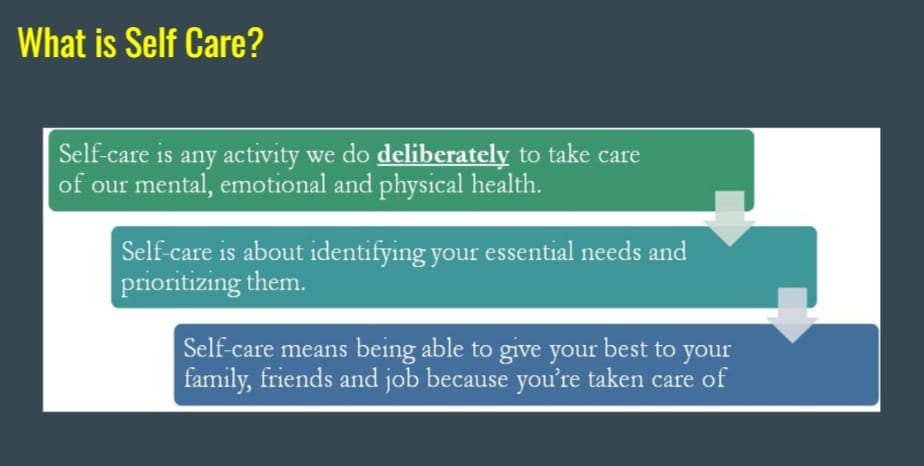
Could everybody just throw an idea in the chat of what you feel comfortable to committing to taking as your first step in self-care or stress management over the next two weeks? And it can be as simple as:
- I’m going to drink more water,
- I’m going to go to bed ten minutes earlier,
- I’m going to walk around,
- I’m going to get up and take a brain break,
- I’m just going to stretch, put my arms over my head, stretch my body, make the habit of getting up maybe twice a day and setting alarm to do that.
I’d love to kind of hear your ideas of what you guys have as to what you feel comfortable doing over the next couple of weeks to build that relaxation response into your daily activity.
Remember, it doesn’t need to take up a lot of time, but it is a commitment. It’s a commitment to yourself.
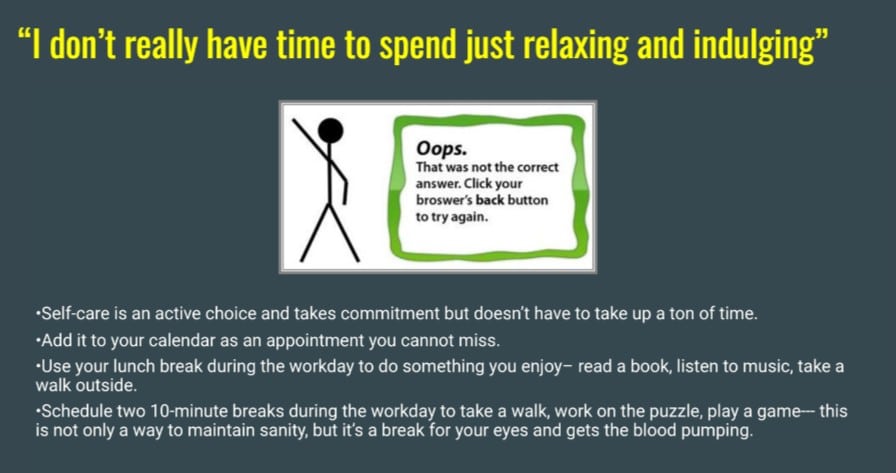
If you want, you can add it to your calendar. Or if it’s a habit, like taking two breaks a day to breathe, that’s a habit in and of itself. You could set an alarm for that.
So we have someone here suggesting to take 10, 15 minutes before I start my workday to be still, to pray, and to deep breathe. I love that. There’s so much about how you start your day is how your day goes. So that sounds like a really great habit.
And if you don’t have 15 minutes, you could take ten. If you don’t have ten minutes, you can take five. And remember, it’s good enough!
The point is I want you to think about “What is a simple action I can do every day to support myself?” And it should be something that you feel good about, that you look forward to doing.
So we have another comment saying: “I’m going to commit to taking a daily brain break”. I love that. What you could think about is what time I do that. For me, the afternoons are usually when I start to kind of slump down a little bit. So that’s the most important time for me to get up, to stretch, to change my environment, walk around a little bit, just have that like five to ten-minute little brain break. And that makes a big difference in my energy level.
That is a great commitment there.
Other Ideas for Self-Care
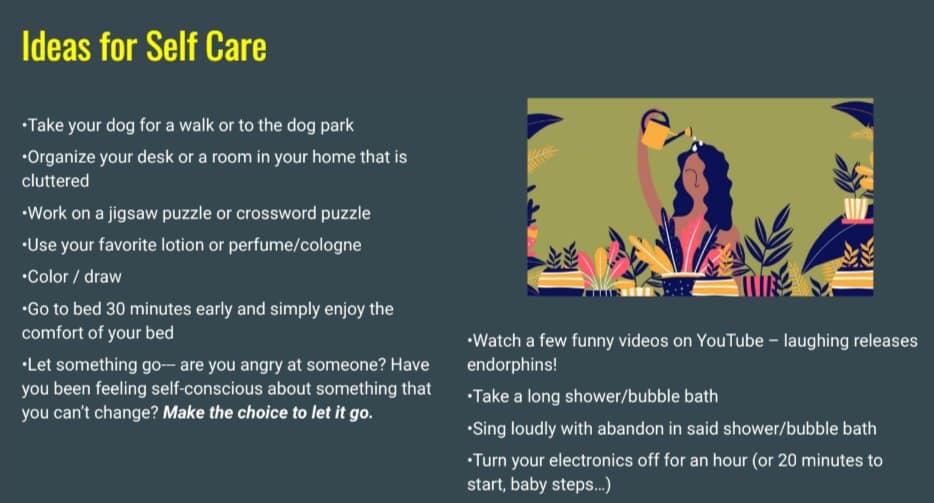
If you recognize any of the symptoms that we talked about, especially the symptoms of burnout, then please reach out and get some support.
Here are other examples of self-care, such as the jigsaw puzzle or knitting. That’s another thing that some people find that just really kind of helps take your mind off of everything
I like to organize cluttered things. This is something that I like to do when I feel stressed because I feel less chaotic when things are more organized.
We already heard some of you talk about setting boundaries simplifying prioritizing saying no to things.
What I was going to say is you can talk to a counselor, but also if you’re at that place of feeling burnt out, then you might even consider a skills group like one of our DBT skills groups. In that group, you’re learning practical skills to help to deal with emotional overwhelm, interpersonal relationships, and things like that throughout that group process, and then you’re also connecting with other people.
So a great resource to consider if you are feeling burnt out or stressed is learning some DBT skills but certainly “name it to tame it” so talking to someone, writing in a journal, talking to a friend, even reaching out and finding support online, maybe reconnecting with someone that way is also helpful.
Eddins Counseling Group is Here for You
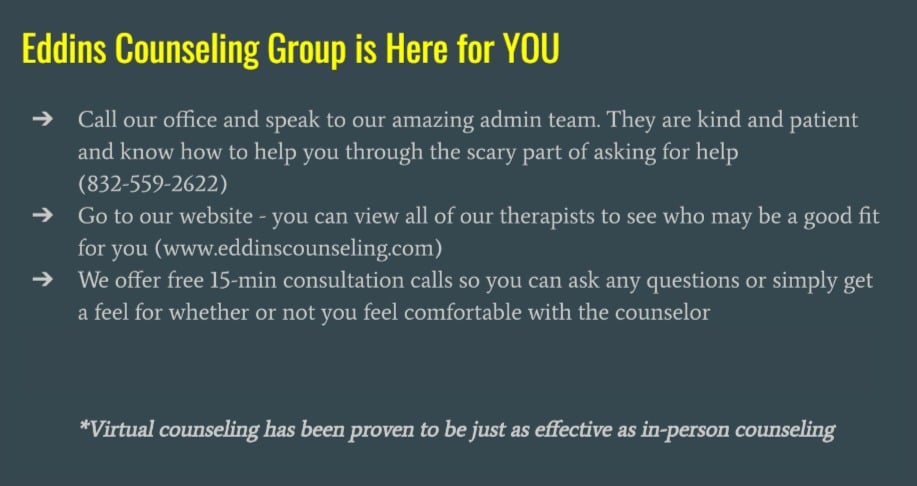
Let us know how we, at Eddins Counseling Group, can support you. We’re happy to do a free 15 minutes consultation and find out a little bit more about your situation.
We can give you some feedback and some resources on options that might be a good fit for you, whether it’s counseling or whether it’s some other resource in the community because we do have access to several other resources as well.
Thank you so much for joining and sharing and participating. I really loved getting insights and your examples. Those were really wonderful. Thank you so much. Goodnight, everybody.
Grounding & Self Soothing
Get instant access to your free ebook.
7 Mood-Boosting Tips
Get instant access to your free ebook.
Why You Feel This Way
Get instant access to your free ebook.
Create Healthier Thoughts & Feelings
Get instant access to your free ebook.


